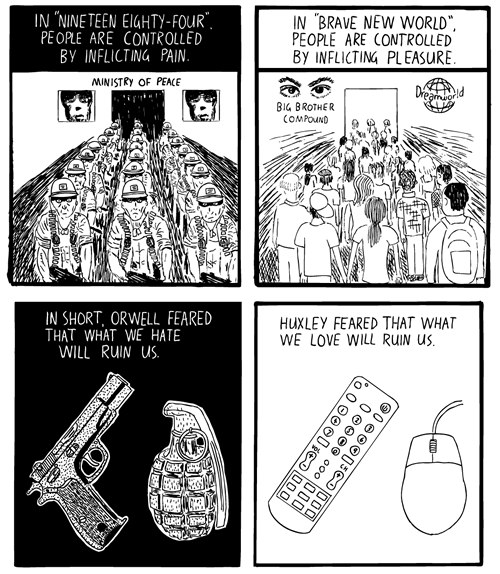To Understand America’s Growing Nanny State, Read Brave New World and 1984
 The twentieth century gave us two visions of a dystopian future. Aldous Huxley’s Brave New World and George Orwell’s 1984. For many years it was assumed that 1984 was the more prophetic tale. But no more. The totalitarianism of 1984 was a product of the age of Stalin, Lenin, Hitler, and Mussolini, the dictators of a continent with a grand tradition of political and religious absolutism. — Jonah Goldberg
The twentieth century gave us two visions of a dystopian future. Aldous Huxley’s Brave New World and George Orwell’s 1984. For many years it was assumed that 1984 was the more prophetic tale. But no more. The totalitarianism of 1984 was a product of the age of Stalin, Lenin, Hitler, and Mussolini, the dictators of a continent with a grand tradition of political and religious absolutism. — Jonah Goldberg
Brave New World was a dystopia based on an American future, where Henry Ford is remembered as a messiah (it’s set in the year “632 A.F.,” after Ford) and the cult of youth that Huxley so despised defines society. Everything is easy under the World State. Everyone is happy. Indeed, the great dilemma for the reader of Brave New World is to answer the question, what’s wrong with it?
There’s a second important difference between the two dystopias: 1984 is a masculine vision of totalitarianism. Or rather, it is a vision of a masculine totalitarianism. Huxley’s totalitarianism isn’t a “boot stamping on a human face–for ever,” as described in 1984. It’s one of smiling, happy, bioengineered people chewing hormonal gum and blithely doing what they’re told. Democracy is a forgotten fad because things are so much easier when the state makes all your decisions.
 In short, Huxley’s totalitarianism is essentially feminine. Orwell’s was a daddy-dystopia, where the state is abusive and bullying, maintaining its authority through a permanent climate of war and the manufacture of convenient enemies. Huxley’s is a maternal misery, where man is smothered with care, not cruelty. But for all our talk these days about manliness, individualism, and even the “nanny state,” we still don’t have the vocabulary to fight off nice totalitarianism, liberal fascism.
In short, Huxley’s totalitarianism is essentially feminine. Orwell’s was a daddy-dystopia, where the state is abusive and bullying, maintaining its authority through a permanent climate of war and the manufacture of convenient enemies. Huxley’s is a maternal misery, where man is smothered with care, not cruelty. But for all our talk these days about manliness, individualism, and even the “nanny state,” we still don’t have the vocabulary to fight off nice totalitarianism, liberal fascism.
 The twentieth century gave us two visions of a dystopian future. Aldous Huxley’s Brave New World and George Orwell’s 1984. For many years it was assumed that 1984 was the more prophetic tale. But no more. The totalitarianism of 1984 was a product of the age of Stalin, Lenin, Hitler, and Mussolini, the dictators of a continent with a grand tradition of political and religious absolutism. — Jonah Goldberg
The twentieth century gave us two visions of a dystopian future. Aldous Huxley’s Brave New World and George Orwell’s 1984. For many years it was assumed that 1984 was the more prophetic tale. But no more. The totalitarianism of 1984 was a product of the age of Stalin, Lenin, Hitler, and Mussolini, the dictators of a continent with a grand tradition of political and religious absolutism. — Jonah Goldberg In short, Huxley’s totalitarianism is essentially feminine. Orwell’s was a daddy-dystopia, where the state is abusive and bullying, maintaining its authority through a permanent climate of war and the manufacture of convenient enemies. Huxley’s is a maternal misery, where man is smothered with care, not cruelty. But for all our talk these days about manliness, individualism, and even the “nanny state,” we still don’t have the vocabulary to fight off nice totalitarianism, liberal fascism.
In short, Huxley’s totalitarianism is essentially feminine. Orwell’s was a daddy-dystopia, where the state is abusive and bullying, maintaining its authority through a permanent climate of war and the manufacture of convenient enemies. Huxley’s is a maternal misery, where man is smothered with care, not cruelty. But for all our talk these days about manliness, individualism, and even the “nanny state,” we still don’t have the vocabulary to fight off nice totalitarianism, liberal fascism.
Goldberg seems to join Orwell and Huxley in thinking that the masses of people have an in-built penchant for some form of totalitarian control over their lives. Of course, freedom and quality-of-life are sacrificed in such small increments that even negative change is accepted without question. Hello Charles Darwin, who also described the mechanism by which human life “devolves.” Read the fuller context of this review in Liberal Fascism, pp. 349-350.